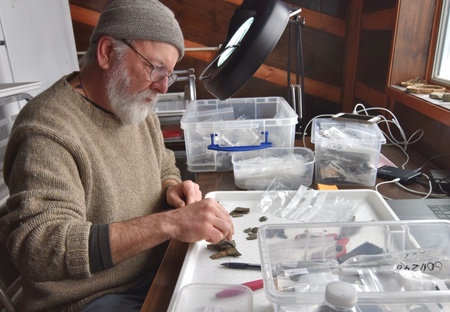An Aberdeen archaeologist is spending lockdown in one of the most remote areas of the planet.
Dr Rick Knecht from the University of Aberdeen has been in Quinhagak – a small Alaskan village which has no roads and endures freezing winters – since October.
He has worked on the Nunalleq dig site for the last 11 years with each visit lasting several months.
Dr Knecht leads a team of archaeologists in partnership with the village corporation Qanirtuuq, Inc. and the Yup’ik village of Quinhagak and their work has uncovered more than 100,000 important artefacts which tell the stories of the region’s people dating back more than four centuries.
Their efforts are a race against time as melting ice and raging winter storms threaten to reclaim the Nunalleq archaeological site which has revealed wooden ritual masks, ivory tattoo needles, and even a belt of caribou teeth, all preserved in extraordinary condition thanks to the arctic soil.
But even this small and remote community has not escaped the threat of Covid-19.
Dr Knecht said: “Quinhagak was one of the first villages to go on lockdown with the onset of the pandemic. Non-residents are forbidden in the village until at least the end of May and any villagers returning from the outside must endure a strict 14-day quarantine, along with members of their household.
“Masks in public places are mandatory and there are limits on how many customers can enter village stores. I was honoured to be counted among Quinhagak's residents and allowed to stay. This is our 11th year working here and we have become part of the community.”
Over the last decade Dr Knecht has become used to the difficult conditions however this season has proved a particular challenge.
“It has been a cold winter with wind chills exceeding -60. Caribou have been scarce and for the first time in memory, starving wolves invaded the community looking for food,” he added.
“Armed men patrolled the village outskirts and children were sheltered in homes and occasionally evacuated from outdoor playgrounds using school buses. Pipes froze across the village and I'm still without plumbing in my cabin. But the temperatures now are above freezing in mid-day and the tundra has emerged from the snow.
“Unfortunately the villagers now have another threat to contend with. The nearest case of Covid-19 is now in Bethel, some 70 miles away but supplies are still coming in on a regular basis and the first runs of salmon will be swimming upstream in about a month. Trout fishing through the ice has been productive in the meantime and hunters are harvesting and sharing moose and caribou meat.”
Meanwhile archaeological research on Quinhagak's past quietly continues. The Culture Center opened as a partnership between the University of Aberdeen and Qanirtuuq, Inc is closed to the public and summer digs are unlikely to take place but work continues to catalogue some of the 100,000 items already uncovered.
Dr Knecht said: “Dating to the 16th and 17th centuries A.D. these artefacts have given us our first detailed look at Yup'ik culture before outside contact. It is also the first time that such an important and spectacular collection has ever been housed and curated by an Alaska Native village.
“Quinhagak is very remote and so research on the collection is immeasurably enriched by community engagement and participation as traditional and scientific knowledge are applied in combination. Although socializing with elders and culture bearers has been curtailed with social distancing, we can still exchange ideas through local internet and texting.
“Lockdown has provided a unique opportunity to focus on collections work - time that is otherwise very hard to get - and by summer's end I hope to have the collection completely catalogued.
“As soon as the pandemic clears, I will return to my post at the University of Aberdeen to help organize publication of a monograph on the site.”


